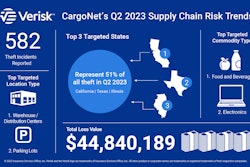In the rapidly evolving landscape of logistics and delivery services, the seamless management of time-sensitive shipments has become a critical factor for businesses striving to stay ahead of the competition. Scheduled delivery management, an increasingly popular approach, offers a strategic solution to enhance operational efficiency while significantly elevating customer satisfaction.
In the realm of modern-day logistics and delivery services, the adage "time is money" holds truer than ever before.
Inefficiencies in delivery operations can lead to increased costs, missed opportunities, and, most importantly, dissatisfied customers. This is where scheduled delivery management steps in as a formidable tool that empowers businesses to optimize their operations and achieve a new level of efficiency.
One of the key benefits of scheduled delivery management lies in its ability to optimize resource allocation. By carefully planning delivery routes and time slots, businesses can ensure that each vehicle and delivery personnel is utilized to their maximum potential. This eliminates unnecessary mileage, reduces fuel consumption, and minimizes wear and tear on vehicles, leading to substantial cost savings. With the right scheduling strategy, businesses can do more with less, maximizing their operational capacity without compromising on service quality.
Scheduled delivery management enables businesses to streamline their operations and eliminate time wastage.
By allocating specific time windows for each delivery, drivers can adhere to a well-structured plan, reducing the chances of delays or overlapping schedules. This level of organization and efficiency not only minimizes the risk of missed deliveries but also enables businesses to handle more orders in less time. As a result, the turnaround time for deliveries significantly improves, enhancing customer satisfaction and fostering a positive brand image.
Despite careful planning, unexpected events may still arise in the delivery process. Scheduled delivery management caters to such contingencies with its inherent flexibility and adaptability. With real-time tracking and intelligent rerouting capabilities, businesses can swiftly adjust their delivery schedules to accommodate last-minute changes, adverse weather conditions, or traffic disruptions. This agility not only ensures on-time deliveries but also strengthens the overall reliability of the delivery service.
In addition to optimizing operations, scheduled delivery management offers several economic advantages that can significantly impact a company's bottom line. As businesses face increasing pressure to minimize costs and maximize profits, embracing scheduled delivery becomes a strategic imperative.
Transportation expenses often form a substantial portion of a company's operational budget.
By implementing scheduled delivery management, businesses can curtail these costs significantly. The optimized route planning and consolidation of deliveries during specific time frames lead to more efficient use of vehicles and fuel, resulting in direct cost reductions. Moreover, decreased mileage and reduced vehicle idle time lead to extended vehicle lifespans and lower maintenance costs, further contributing to long-term savings.
For businesses managing perishable goods or time-sensitive inventory, scheduled delivery management can be a game-changer. With precise delivery schedules, businesses can better align their inventory levels with customer demand, minimizing the need for excessive stockpiling. As a result, inventory holding costs decrease, freeing up capital that can be invested in other areas of the business.
Customer retention is invaluable for any successful business. Scheduled delivery management plays a pivotal role in elevating customer satisfaction levels, resulting in higher customer retention rates and increased loyalty. Satisfied customers are more likely to become repeat buyers and brand advocates, leading to a positive impact on a company's revenue and reducing the need for costly customer acquisition efforts.
Customer satisfaction lies at the core of any successful business, and in the context of delivery services, meeting customer expectations is paramount. Scheduled delivery management plays a pivotal role in elevating customer satisfaction levels by providing a timely and transparent delivery experience.
Timely delivery is the cornerstone of customer satisfaction in the delivery industry. When customers choose a specific delivery time slot, they expect their orders to arrive promptly within that window. Scheduled delivery management ensures that deliveries are carefully planned and optimized to meet these expectations, reducing the chances of delays or missed deliveries.
With scheduled delivery, businesses can set accurate delivery time frames, allowing customers to plan their day and be available to receive their orders. By meeting these expectations consistently, businesses can build trust and reliability, enhancing the overall customer experience.
Timely deliveries not only impress customers but also save them from the frustration of waiting for extended periods. By streamlining operations and adhering to the scheduled time slots, businesses can significantly reduce waiting time and create a positive impression of their brand.
With precise delivery scheduling, businesses can minimize failed delivery attempts. Customers appreciate not having to deal with redelivery or pick-up hassles, resulting in a smoother delivery experience.
Like timely deliveries, transparent communication is key to establishing strong customer relationships and ensuring satisfaction. Scheduled delivery management platforms facilitate open and real-time communication between businesses, drivers, and customers, which plays a vital role in enhancing customer satisfaction.
Through scheduled delivery platforms, customers can track their orders in real time, receiving updates on their delivery status and estimated arrival times. This level of transparency keeps customers informed, alleviating any anxiety or uncertainty about their deliveries.
In case of unforeseen delays or changes in delivery plans, scheduled delivery management platforms can send proactive notifications to customers, keeping them informed about any modifications to their delivery schedules. This proactive approach demonstrates a business's commitment to providing reliable service and caring for its customers' needs.
Transparent communication builds trust with customers, showcasing a business's dedication to keeping them in the loop throughout the delivery process. Trust and credibility are crucial for customer loyalty and positive word-of-mouth referrals.
Transparency and communication also empower customer service teams to handle inquiries more effectively. When customers have access to real-time tracking information and delivery updates, they are less likely to contact customer support for basic delivery queries, enabling support staff to focus on addressing more complex issues.
The future of delivery management is poised for exciting advancements as technology continues to evolve rapidly. One prominent trend that is expected to shape the industry is the integration of artificial intelligence (AI) and machine learning algorithms. These technologies will further enhance route optimization, predictive analytics, and demand forecasting, allowing businesses to achieve unparalleled levels of efficiency and cost-effectiveness. Additionally, the rise of environmentally-conscious practices is likely to lead to a surge in eco-friendly delivery solutions, such as electric vehicles and last-mile delivery options that minimize the carbon footprint. As customer expectations continue to evolve, there will be a greater emphasis on hyper-personalization and customization, with consumers demanding more flexibility in delivery time windows and interactive communication throughout the delivery process. Embracing these trends will be pivotal for delivery management companies seeking to stay ahead of the competition and deliver a truly modern and customer-centric experience.
Scheduled delivery management holds immense potential to revolutionize the delivery industry by unlocking operational efficiency and elevating customer satisfaction. The power of timely deliveries, transparency, and communication has a profound impact on how customers perceive and interact with businesses.
By embracing scheduled delivery management and leveraging advanced platforms, businesses can position themselves at the forefront of the industry, ensuring seamless operations and delivering unparalleled customer experiences. As the landscape of logistics continues to evolve, staying adaptive to future trends and technology will be key to sustained success and growth in the dynamic world of delivery services.











